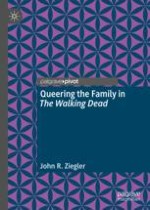2018 | OriginalPaper | Buchkapitel
2. That Is My Wife: Reproductive Futurism and Patriarchal Competition
verfasst von : John R. Ziegler
Erschienen in: Queering the Family in The Walking Dead
Aktivieren Sie unsere intelligente Suche, um passende Fachinhalte oder Patente zu finden.
Wählen Sie Textabschnitte aus um mit Künstlicher Intelligenz passenden Patente zu finden. powered by
Markieren Sie Textabschnitte, um KI-gestützt weitere passende Inhalte zu finden. powered by
